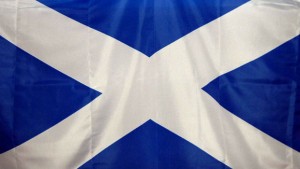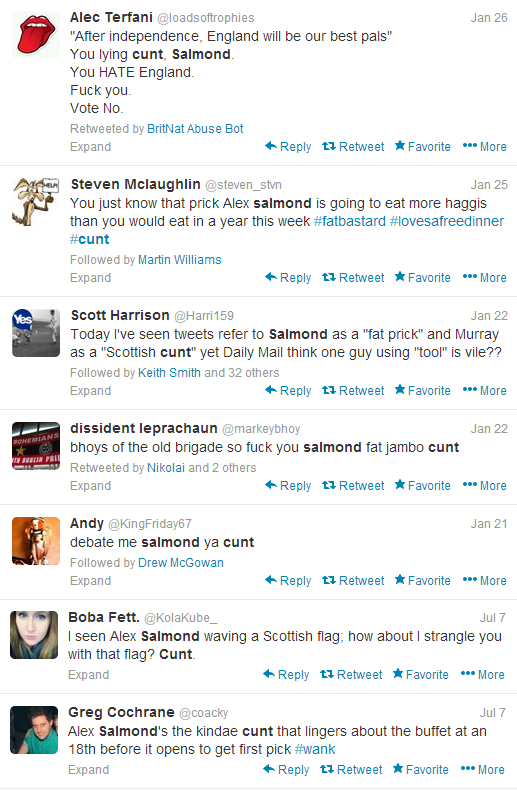
Over the weekend, the Daily Mail published a series of articles about so-called “Cybernats”. That is, people who support Scottish independence who debate and campaign on social media. They chose to take surreptitious photos of certain individuals who post on Twitter and then confronted them on their own doorsteps. These “Cybernats” were accused of poisoning the debate on independence and featured in a two-page spread alleging that they abused those who disagreed with them.
Many of the comments quoted were pretty tame stuff and the rest were much what you would expect if you have ever posted on any kind of internet forum on any topic. There was what we will call “robust” language but that is how people speak and to disagree with someone is not the same as abuse. The article was very one-sided and neglected to mention countless vile comments about senior SNP politicians, especially First Minister Alex Salmond. Doing his job as First Minister has seen the following abuse on Twitter:

We read last night one example of the real poisoning of the independence debate. Someone posted the following on Twitter:
This kind of thing has no place in political debate and we hope that Police Scotland deal with this individual appropriately. Leaving aside the idiocy of the comment, it is interesting to look at how we reached the point where people feel that it is OK to make public death threats against the democratically elected First Minister of Scotland.
There has been a concerted attempt by opposition politicians to target Alex Salmond on a personal level, taking aim at what they see as believable vulnerabilities. There has been smear after smear and no matter how resilient he is, some of these are bound to stick. In no other walk of life would it be acceptable for journalists to routinely refer to someone in the way Alex Salmond is referred to. His weight is routinely commented on as is his perceived arrogance. His opponents know that they can sell his self-confidence as the negative traits of arrogance or smugness and there has been an effort over some time to do just that.
A senior aide to the Leader of the Labour Party in Scotland Johann Lamont sparked controversy when he asked if Alex Salmond was “an arse” on social media. Paul Sinclair who was previously a journalist at the Daily Record was apparently unrepentant when asked about it by fellow Twitter users. Those appalled included Mandy Rhodes, editor of Holyrood Magazine.
As bizarre as it sounds, it is not a new occurrence for Labour staff to use expletives to describe Alex Salmond, with one being forced to resign previously in 2007 after referring to Mr Salmond a “c*nt” at an awards ceremony.
It is not only Labour staffers that are responsible for this, their bosses the elected politicians must be held accountable too. Johann Lamont has sailed close to the wind a few times with her descriptions of the First Minister at FMQs, showing little respect for him on a personal level with terms like “chancer” and other choice phrases implying he is a liar. Several of her party colleagues have gone much further and compared the First Minister to various dictators across the globe.
- In 2009 Lord George Foulkes (then a Labour MSP) referred to Salmond as Il Duce, a nickname for the Italian fascist dictator Benito Mussolini.
- In November 2011 Lord Cormack, a Tory peer asked if Alex Salmond was seeking to emulate Robert Mugabe, the Zimbabwean dictator.
- In January 2012 Tom Harris (Labour MP) had to resign from his role as Labour’s new media advisor after posting a video comparing Alex Salmond to Hitler.
- In February 2012 Dennis McShane, a Labour MP referred to him as Slobodan Salmond, a reference to Slobodan Milosevic, convicted war criminal and former Serbian President.
- In the case of Anas Sarwar in January last year, just calling Holyrood a dictatorship was good enough and saying that it is “not a democratic place”.
- Edit: In June 2014 Alistair Darling compared Alex Salmond to dead North Korean dictator Kim Jong-il in an interview with the New Statesman magazine and agreed that “at heart” the SNP’s nationalism was not “civic nationalism” but “blood and soil” nationalism. (A reference to Nazi Germany.) Audio extract
